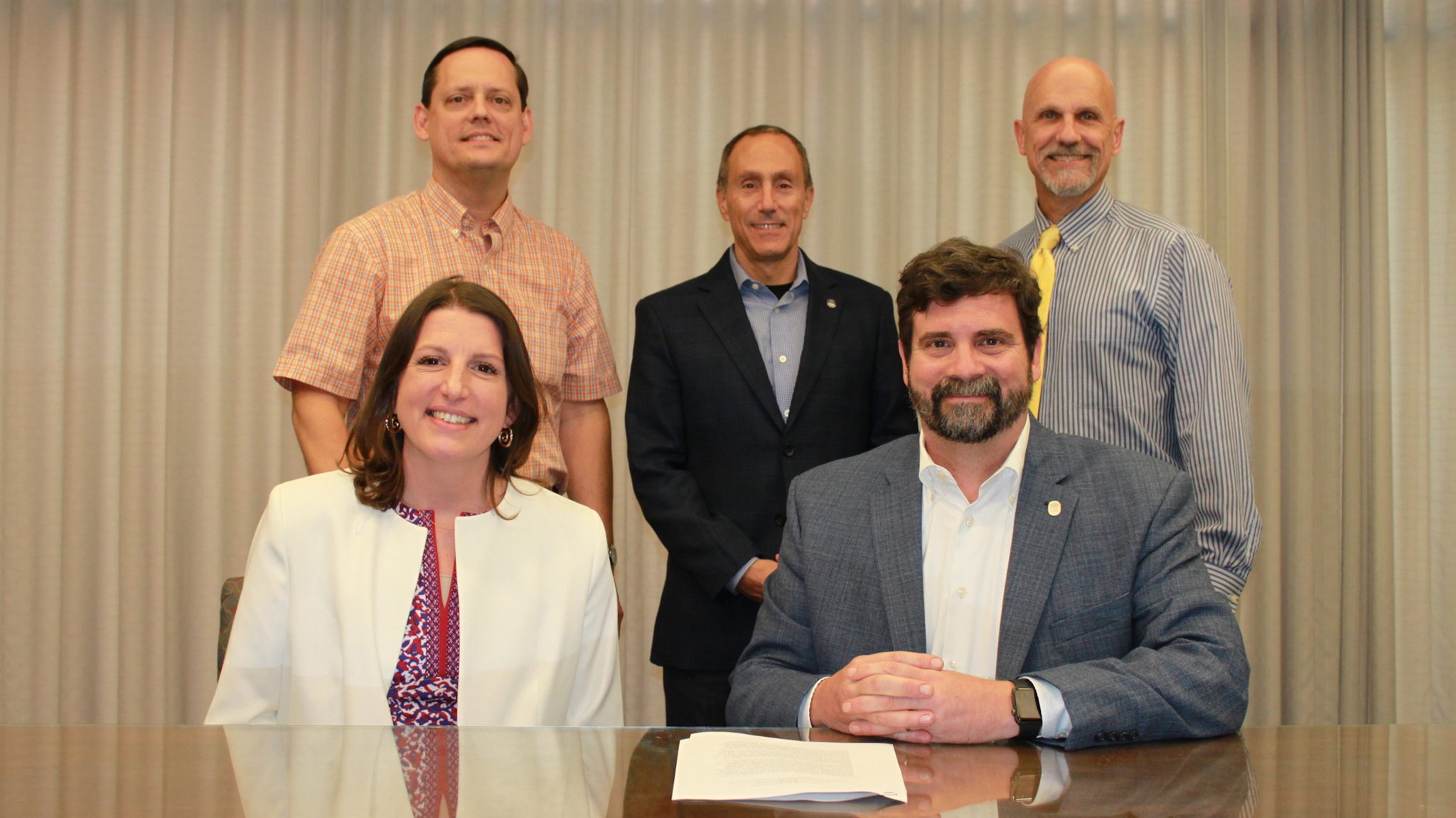
Officials from the University of Mississippi and the U.S. Geological Survey Lower Mississippi-Gulf Water Science Center gather Aug. 9 to sign a memorandum of understanding establishing a collaborative partnership to research water security in the Southeast. Present at the signing ceremony are (seated, from left) Jeannie Barlow, deputy director of the center, and Josh Gladden, UM vice chancellor for research and sponsored programs; and (standing, from left) Andy O’Reilly, UM assistant professor of geology and geological engineering; Dave Puleo, UM dean of engineering; and Gregg Davidson, UM professor and chair of geology and geological engineering. Photo by Shea Stewart/University of Mississippi
OXFORD, Miss. – The University of Mississippi and the U.S. Geological Survey Lower Mississippi-Gulf Water Science Center have formed a collaborative partnership to strengthen scientific and technical research related to the availability, valuation and security of water in the Southeast.
More than 90 percent of Mississippi’s population relies on groundwater for its drinking water supply, according to the Mississippi Department of Environmental Quality’s 2018 Annual Report. In the Southeast, nearly 60 percent of water used is supplied by groundwater, the USGS reported in its 2015 National Water Census.
With groundwater being so important to the region, sustainable aquifer management is needed. That management depends on scientific knowledge for effective decision-making, which the new collaboration will support.
“Collaborative agreements such as this have proven to be an effective means to foster a closer working relationship with external partners,” said Josh Gladden, the university’s vice chancellor for research and sponsored programs. “We’re excited about the research that is already occurring between our two institutions and the potential to expand that work in both research and education directions.”
The collaboration covers a five-state region – Alabama, Arkansas, Louisiana, Mississippi and Tennessee – of great ecological diversity with an abundance of water resources.
“The coalescence of our five states has allowed the U.S. Geological Survey Lower Mississippi-Gulf Water Science Center the unique opportunity to reach across state and institutional boundaries and work together as one united entity,” said Scott Gain, the center’s director. “One aspect of this mission is to integrate the unique capabilities of academia to help address multifaceted, interdisciplinary, interjurisdictional water-resource problems.
“The University of Mississippi and the Lower Mississippi-Gulf Water Science Center can work together to solve fundamental problems of local and national interest with immediate practical application.”
The memorandum of understanding, signed Aug. 9, continues a history of UM and the center collaborating on shared interests, particularly in the intensively cultivated and water-stressed Mississippi Delta.
Gregg Davidson, UM professor and chair of geology and geological engineering, has led several research projects investigating the role played by oxbow lakes in recharging alluvial aquifers, focusing on Sky Lake in Humphreys County.
“Processes governing the groundwater-surface water connectivity of oxbow lakes and their associated lakeshore wetlands are poorly understood,” he said. “Conventional understanding considers oxbow lakes like bathtubs with impermeable bottoms.
“Our past research suggested that oxbow lakes may recharge the alluvial aquifer in the Delta via preferential pathways caused by decaying tree limbs and roots embedded in the bottom sediments of the forested wetlands fringing the lake.”
A study completed this year confirms previous research.
“Taken together, these research results indicate that recharge occurs by leakage of lake water through preferential pathways in the wetland fringe and coarse-grained point-bar deposits, especially during wet periods when the lake water level is elevated,” Davidson said.
Andy O’Reilly, an assistant professor of geology and geological engineering, has been working with the Lower Mississippi-Gulf Water Science Center since 2015 to develop a stronger partnership between the two institutions. That collaboration includes two Ole Miss graduate students conducting research for thesis and dissertation purposes through a USGS study on water availability.
“It truly is a win-win-win situation, with the center, UM faculty and UM students each contributing to and benefitting from the relationship,” O’Reilly said.
The graduate students were hired as student interns in the USGS Pathways Program, which are paid positions where their tuition expenses for Ole Miss coursework are supported by the USGS. The students gain valuable experience as professional geoscientists while working on their research, and that may lead to permanent federal employment after graduation.
“As faculty, I have the opportunity to work with geoscientists who are internationally recognized in their fields of expertise and have access to world-class research facilities,” O’Reilly said. “The center benefits from UM’s expertise in areas of research that can be targeted to fill their changing needs and the opportunity of serving as adjunct faculty on thesis and dissertation committees and as course instructors.”
Plans for collaboration between the center and the university include development of an educational partnership agreement to support center employees as both students and instructors for UM courses, teaching of short courses on the Ole Miss campus for geoscience professionals and students, and working with other university research centers, such as the Mississippi Mineral Resources Institute, the National Center for Computational Hydroscience and Engineering, and the National Center for Physical Acoustics.